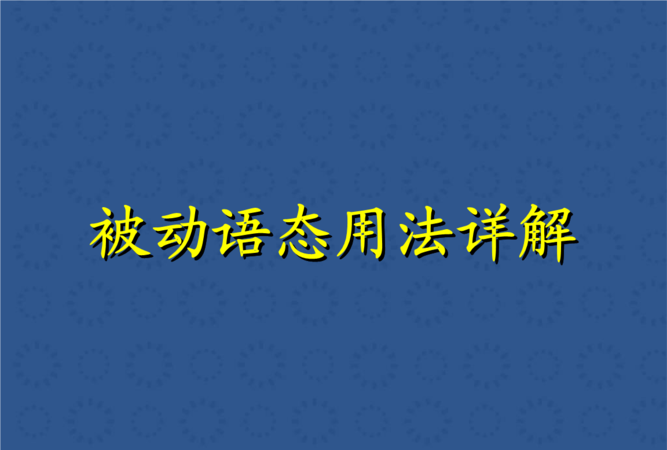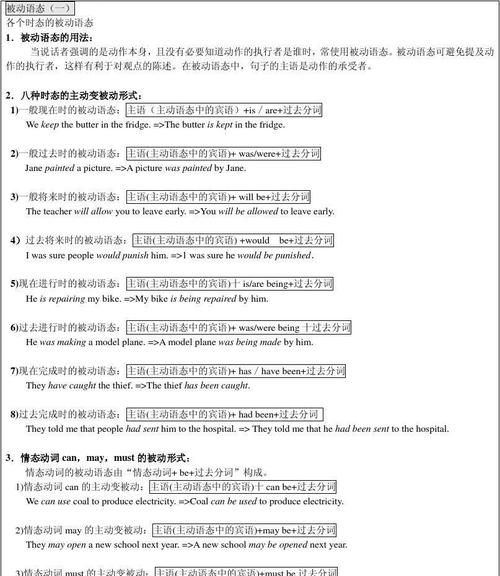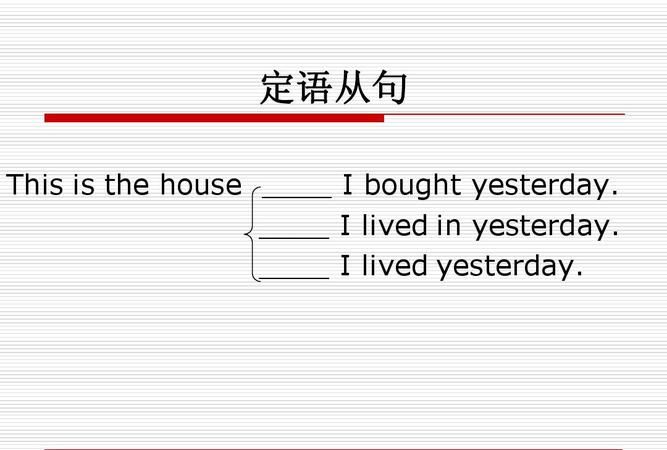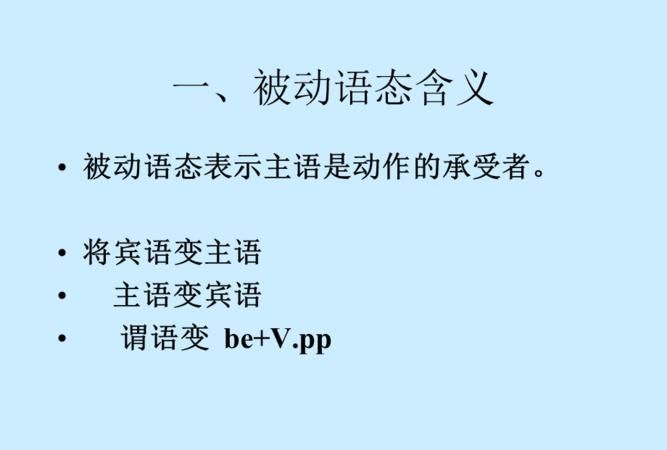本文目录
五个被动语态的英语句子加翻译
1. 一般现在时的被动语态构成:is / am / are + 及物动词的过去分词
Our classroom is cleaned everyday.
I am asked to study hard.
Knives are used for cutting things.
2. 一般过去时的被动语态构成:was / were + 及物动词的过去分词
A new shop was built last year.
Dinosaur eggs were laid long long ago.
3. 现在完成时的被动语态构成:has / have + been + 及物动词的过去分词
This book has been translated into many languages.
Many man-made satellites have been sent up into space by many countries.
4. 一般将来时的被动语态构成:will+ be + 及物动词的过去分词
A new hospital will be built in our city.
Many more trees will be planted next year.
5. 含有情态动词的被动语态构成:情态动词+ be + 及物动词的过去分词
Young trees must be watered often.
Your mistakes should be corrected right now.
The door may be locked inside.
Your homework can be handed in tomorrow.
6. 现在进行时的被动语态构成:am / is / are + being + 及物动词的过去分词
Uncle Wang is mending my bike now.→
My bike is being repaired by Tom now.
They are planting trees over there. →
Trees are being planted over there by them.
7. 不定式的被动语态:to + be + 及物动词的过去分词
There are two books to be read. →
There are twenty more trees to be planted.
1. Bruce writes a letter every week. →A letter is written by Bruce every week.
2. Li Lei mended the broken bike this morning.→The broken bike was mended by Li Lei this morning.
3. He has written two novels so far.→Two novels have been written by him so far.
4. They will plant ten trees tomorrow.→Ten trees will be planted by them tomorrow.
5. Lucy is writing a letter now.→A letter is being written by Lucy now.
6. You must lock the door when you leave.→the door must be locked when you leave.
1.由that引导的定语从句
一般情况下that可指人或物,可以代替who,whom和which,在从句中作主语或谓语动词的宾语,但不能作介词的宾语.如:
The comrade that(who)is speaking at the meeting is an advanced worker.正在会上讲话的那个同志是个先进工人.
Is this the doctor that(whom)you talked about yesterday?这就是你们昨天谈论的那位医生吗?
The letter that(which)I received yesterday was from my father.昨天我收到的信是我父亲寄来的.
2.由who,whom和whose引导的定语从句
who在从句中作主语,whom在从句中作宾语,whose在从句中作定语.如:
This is the thief who stole my bike.这就是偷我自行车的那个贼.
He is the boy whom you wanted to find.他就是你想要找的那个男孩.
The girl whose mother is a doctor is waiting for you outside.妈妈是个医生的那个女孩在外面等你.
3.由which引导的定语从句
which指物,在从句中作主语或谓语动词的宾语.如:
The book which Mum bought me last week is called“Red Star Over China”.妈妈上周买给我的那本书名叫《西行漫记》.
The house which Lu Xun once lived in is now the Lu Xun Museum.鲁迅曾经住过的那所房子现在是鲁迅博物馆.
4.由where,when和why引导的定语从句
where在从句中作地点状语,when在从句中作时间状语,why在从句中作原因状语.如:
I will never forget the day when I joined the League.我永远忘不了我入团的那一天.
He will go back to the school where he studied next week.下周他要回到他曾经学习过的学校.
I don't know the reason why he quarreled with Zhang Lin.我不知道他同张琳吵架的原因.

定语从句 过去完成时 被动语态 不定式用法例句
定语从句由关系代词who、whom、whose、which、what、as和关系副词where、when、why等引导,但须记住:
1.what不能引导定语从句.
2.关系词的分析须考虑它在定语从句中的成分。
一.指人的关系代词有who、whose、whom、that. 试分析:
The old man who/whom /that we visited yesterday is a famous artist.
Miss Wang is taking care of the child whose parents have gone to Beijing .
The man with whom my father shook hands just now is our headmaster. (=The man who/whom that my father shook hands with just now is our headmaster.)注:
A. 指人时有时只用who不宜用that。
1.先行词为one、ones或anyone
(1)The comrade I want to learn from is the one who studies hard and works hard.
(2)Anyone who breaks the law should be punished.
2.先行词为these时
These who are going to Beijing are the best students of our school.
3.在there be 开头的句子中
There is a student who wants to see you.
4.一个句子中带有两个定语从句,其中一个定语从句的关系代词是that,另一个宜用who,以免重复。
The student that won the first prize is the monitor who works hards.
5.在非限制性定语从句中
A。I met a friend of mine in the street, who had just come from Japan.
B.主句以who开头的句子中,只用that,不用who。
二.指物的关系代词有which、whose(=of which)、that. 试分析:
1. I like the books which / that were written by Lu Xun.
2. The desks (which/that) we made last year were very good.
3. This is the house in which we lived last year. (= This is the house which /that we lived in last year.)
4. I live in the room whose windows face south. (= I live in the room ,the windows of which face south.)
注:
A. 介词如果位于作为其宾语的关系代词之前时,只能用whom、 which不能用who或that.
(1). The girl about whom they were talking is our monitor.
(2). The book in which there are many interesting things was written by Li Ming.
B. 部分短语动词中的介词不可与动词拆开,在定语从句中其介词不可前置,只能放在其动词之后。
Is this the book which she is looking for?
The old man who/whom they are waiting for is Professor Li.
The child who/whom she is looking after is Wang Ping’s son.
C. 指物时,下列情况下只能用that ,不宜用which。
(1)先行词为不定代词,如All、much、anything、everything、nothing、something、none、the one等。
We are willing to do anything that is good to the people.
I have told them all (that) I know.
All that can be done has been done.
(2)先行词是序数词或被序数词、修饰时。
The first book that I read last night was an English novel.
(3)先行词是形容词最高级或被最高级修饰时。
This is one of the most interesting films that I have ever seen.
This is the best that can be done now.
(4)如果有两个或两个以上分别表示人和物的先行词时(先行词既有人又有物),定语从句的关系代词用which和who都不合适,只能用that。
We know nothing about the doctors and the hospitals that you are talking about.
There are sheep and men that can be seen on the hill.
(5)如果先行词被the only、the very、the last、the same、any、 few 、little、no、 all 、one of、 just修饰时。
This is the only book that can be lent to you.
(6)当主句是以which开头的特殊问句时,关系代词只用that。
Which is the dictionary that he used yesterday ?
D.只物时,下列情况下只能用which,不宜用that。
(1)关系代词放在介词之后
This is the factory in which we once worked.
(2)非限制性定语从句中
This is the book, which is written by Lu Xun.
(3)that,Those作主语时
Those which are on the desk are English books.
E.先行词前有such、the same、 as时, 关系代词用as,不用that, 但the same…as…表示同样的, the same…that…表示同一的
He knows as many people as are present at the meeting.
Such people as you refer to are rare nowadays.
三.比较When/which、where /which、why.
which I still never forget.
This is the day when I joined the party.
which he spent reading the books.
where I found the book.
which makes machines.
This is the place which we once visited.
which I will never forget.
which I am looking for.
限制性定语从句与非限制性定语从句的区别:
限制性定语从句
非限制性定语从句
All the students who study hard have passed.学习努力的学生都考试及格了。(只有努力的及格了,不努力的没及格。) All the students ,who study hard have passed.所有的学生都及格了,他们学习努力。(没有人不及格,这些学生都很努力。)
从句是先行词不可缺少的定语(如去掉,主句意思就不完整或不正确。) 从句是对先行词的附加说明(如去掉,主句意思仍清楚,不受影响。) 与主句关系密切,不用逗号 与主句关系不十分密切,用逗号与主句隔开译为汉语时,从句译在先行词前,与先行词用“的”连接 译为汉语时,从句放在主句后面关系代词that可以代替who、whom(指人)、which(指物) 关系代词不用that,只用who、whom(指人)、which(指物) 关系代词代替宾语时可以省略 关系代词不能省略关系代词as和which
先研究下面两个例句:
○1.This elephant is like a snake, as /which everybody can see. =As everybody can see, this elephant is like a snake. 任何人都看得出来,这头象像条蛇。
○2.Tom didn’t pass the physics exam, which made his parents very angry. Tom物理考试不及格,这使得他父亲很生气。
这两个例句中,as和which所代表的都是整个主句所表示的内容。但有两点不同之处:
1. 在形式上as引导的非限制性定语从句可位于主句的后面,也可位于主句的前面;而which引导的非限制性定语从句只能位于主句的后面,不能位于主句的前面。
2. 在意义上,as引导的定语从句和主句的关系一般为一致关系,常译为“正如……”,“就像……”,而which引导的定语从句和主句的关系是因果关系,或which引导的定语从句是对主句的评论。因此,在意思通顺的情况下,which可代替as,而as许多时候不能代替which,如句○2。再如:
1.He was late again, as / which we had expected. =As we had expected, he was late again. 正如我们所料,他又迟到了。/他又迟到了这是我们早就料到的。
2. The street hasn’t been cleared for weeks, which makes it very dirty. 街道好多星期没有打扫了,因此整条街很脏。(不用as)
3.The young man cheated his friend of much money, which was disgraceful. 那年轻人诈骗了他朋友许多钱财,这是不光彩的。(不 用as)
4.He takes exercise everyday, which has done a lot of good to his health. 他每天运动,这对他的身体很有好处。(不用as)
5.As has already been pointed out, English is rather difficult for a foreigner. 正如已经指出的那样,英语对于初学者说,是相当难学的。在such…as…、the same…as…、 as…、 as many…/much as…等结构中,as不能用which代替。如:
1.Such books as this are too difficult for beginners. 这样的书对于初学的人来说是太难了。
=Books such as this are …
=Books like this are …
2.I live in the same building as he (does). 我和他住再同一座大楼里。
3.He knows as many people as are present at the meeting. 他认识所有到会的人。
4.That day we all got up early as usual. 那天我们和平时一样,都起得很早。
“One of the +复数名词”后面定语从句中谓语单复数情况
这一结构后面的定语从句的谓语动词通常用复数形式,跟定语从句所靠近的那个复数名词在数上保持一致。如:
1. That is one of the books that are required for study at school.
2. This is one of the most wonderful novels that have been published since 1990.
3. She is one of the few persons who know Spanish .
4. This is one of the most famous plays that were written in the thirties,
如果one of +复数名词这一结构前面带有the only、the very之类的限定语,后面定语从句的谓语动词则要用单数形式,这是因为定语从句在意义上修饰的是而不是那个复数名词。如:
1.He is the only one of the teachers who knows French in our school.( 修饰the only one)
He is one of the teachers who know French in our school.( 修饰the teachers)
2.This is the only one of the rooms that is free now. (修饰the only one)
This is one of the rooms that are free now. (修饰rooms)
as与which引导的定语从句
两者均可引导非限制性定语从句,有时可以互换,但下列情况多用as。
1. 关系代词引导的定语从句居句首时。 As we all know, the earth is round.
2. 当与such或the same连用时,一般用as。 Such books as you tell me are interesting. I have the same plan as you.
3. 当从句和主句语义一致时,用as,反之则用which。 She has married again, as was expected. She has married again, which was unexpected.
4. as在从句中作主语时,后面常接行为动词的被动语态,如be known,be said,be reported等,如从句中行为动词是主动语态,一般要用which作主语。
She has been late again, as was expected.
Tom has made great progress, which made us happy.

动词不定式现在分词过去分词作定语的区别
第一个语法现象是动词不定式表将来,to do;
第二个语法现象是过去分词表被动,party与hold之间是被动,所以用held
关于book的例子中,没有表将来的动作,所以不需要用不定式。

含有被动语态的定语从句
额。。。if没有定语从句,if引导的是条件状语从句。比如 If the weather is sunny,we can go swimming.被动语态是要用到过去分词的,还有就是不及物动词是没有被动语态的。例句是 Trees are being planted over there by them.

以上就是关于被动语态作定语例句,五个被动语态的英语句子加翻译的全部内容,以及被动语态作定语例句 的相关内容,希望能够帮到您。
